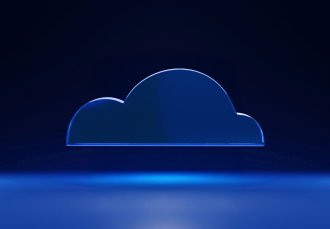
Contact us
Our team would love to hear from you.
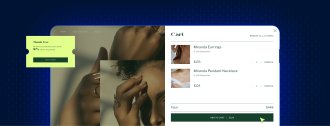
In this article, we will look into the role of IoT in retail, how companies use the technology, and how they benefit from it.
What is the IoT exactly? The term refers to a system of devices connected via the Internet, a company intranet, or another network. These smart products should be able to receive and send data as well as communicate with each other and with other Internet-enabled devices.
With IoT technology, buyers can find the products that they need easily and quickly, check out items while avoiding the inconvenience of standing in lines, get personalized discounts and offers based on their shopping history, customize their purchases, and track the products they have ordered in real time.
Retail companies also benefit. They obtain access to a smart, efficient, and accurate data acquisition system to support informed decisions, develop strategies, optimize procurement and the supply chain, and forecast trends and demand for particular products to increase customer retention and satisfaction.
The adoption of IoT solutions by retailers is on the rise. Statistics demonstrate positive trends in this sphere. In North America, the adoption rate for IoT solutions like connected vending, exceeds 71%. In Europe, 42.5% of retailers have adopted IoT.
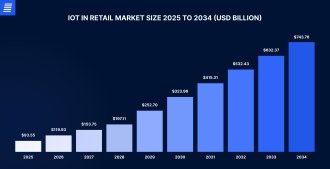

Source: precedenceresearch.com
Retailers who want their brick-and-mortar stores to retain their appeal despite the all-around accessibility of online shopping often integrate IoT into their workflows. Following are some popular IoT applications in retail.
In the retail industry, customer service speed and efficiency play a crucial role. Checkout is one of the shopping stages during which customers don’t want to spend too much time. If the potential buyers have to wait, the store loses money. Self-checkout solves the problem of long lines and overcrowded shops, making the shopping experience simpler and more appealing. IoT-enabled systems facilitate the checkout process by reading tags and charging customers via POS terminals or automatically as they leave the store. Customers are satisfied with the service, and retailers can optimize staff resources and increase revenue.
It’s easy to get one’s bearings in any part of the world with the Global Positioning System (GPS), but how can you navigate inside a store or big mall where GPS hardly works? IoT devices integrated with Bluetooth beacons, Wi-Fi, and radio-frequency identification (RFID) tags provide interactive maps, direct consumers to the products that they are looking for, map optimal shopping routes, and give product recommendations. This saves time and creates an enjoyable in-store experience, encouraging customer loyalty.
Many factors influence the customer experience, in-store environment and, for grocery stores, the freshness of goods like temperature, heating, lighting, ventilation, air quality, and humidity. IoT helps create a smart network of sensors, cameras, and gadgets that control the in-store and warehouse environment. Retailers can use them to reduce energy consumption and energy costs and create a comfortable atmosphere for visitors.
Keeping track of inventory is a challenging endeavor that can become smooth and effortless with the help of IoT solutions. Technologies such as smart shelves with integrated scales monitor inventory levels and send notifications to reorder, allowing retailers to avoid overstocking and shortages. Businesses can also use IoT to develop procurement strategies by analyzing consumer behavior and identifying the most popular products. Digital price tags provide real-time updates to display actual information about a product and support dynamic pricing.
IoT-enabled solutions can track how people move around the store so retailers can organize the placement of goods more profitably. The way customers behave, the areas in which they spend most of their shopping time, the products they buy most often—this data can be used to design a layout that will increase sales of a particular brand or product and the quantity of goods that the customers buy. This increases revenue and also helps sell products with limited shelf life before they expire.
RFID tags, GPS, and sensors, together with IoT devices, play a major role in supply chain management. These technologies help companies improve service by providing customers with real-time information on product location. Every step of the product’s journey from the manufacturer to the consumer is monitored. This is also a great way to control the conditions in which the goods are shipped or stored, identify bottlenecks in the supply chain, and optimize it using better routes.
By analyzing consumer behavior patterns that are collected using IoT-enabled solutions, it is easy to adapt the purchasing experience to every customer. The IoT system can be used to send notifications to the smartphones of people interested in purchases who are near the store, encouraging them to enter and shop. It can also be employed to inform in-store buyers about discounts, special offers, and events. Retailers can interact with their customers in real time by analyzing the information gathered from IoT devices, obtaining feedback from purchasers, and acting on it.
Developing a powerful marketing strategy requires understanding the needs of customers and gaining a competitive advantage. That’s where technological innovations can be of help. Using IoT combined with other technologies, retailers can collect valuable product and customer data, including how people react to marketing campaigns and behave as consumers. With this information, retailers can develop personalized strategies such as location-based targeting.
Innovation brings many new opportunities for retailers. IoT devices combined with technologies such as RFID, near-field communication (NFC), augmented reality, and virtual reality can significantly improve the in-store experience.
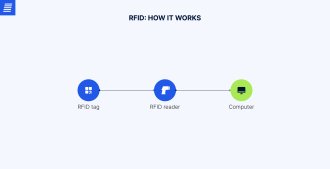

RFID has been around for a few decades and has come a long way since it was first introduced. The affordability and accessibility of this technology have made it popular among retailers and the manufacturing industry.
For RFID to function, two components are required: a tag and a tag reader. An RFID tag on an item transmits unique information about the product to an RFID reader, which is connected to a database that collects and stores data, i.e., product description and specifications, stock levels, price information, etc. This network of devices is used to track inventory, manage procurement and the supply chain, enhance security and prevent theft, collect essential data, and even offer customers a self-checkout option.
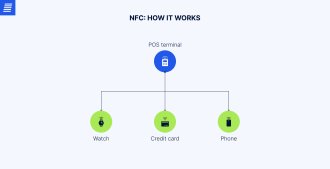

NFC, commonly used for contactless payments, integrates with IoT to enable secure and seamless communication between two devices. Based on RFID technology, it establishes a two-way connection when devices are in close proximity, allowing for fast and easy information exchange and transactions.
RFID communication is one way, whereas an NFC chip can both read various types of data and transmit the data to another chip. In addition, NFC can handle not only identifying information but also more complex data such as text and images. In retail, NFC is used for smart payments, inventory management, and interaction with customers (e.g., providing information about an item, giving recommendations, or redirecting customers to a store’s social platforms).
Augmented reality (AR) and virtual reality (VR) can enhance the application of IoT in retail by creating a unique shopping experience and harnessing data on consumer behavior.
Using IoT devices combined with AR or VR, retail stores can combine virtual objects with real-world surroundings or even design adventures. IoT-enabled sensors track a customer’s body movements, generating a 3D model, while IoT-connected devices capture gestures to enable a realistic experience. A buyer can try on or customize an item of clothing; see furniture in a realistic setting; or participate in a quest prepared as a part of a marketing campaign. The possibilities are nearly endless.
The use of IoT in retail stores is becoming increasingly popular because of the benefits that it offers to businesses. Following are some of the most important advantages of IoT solutions in retail.
Running retail stores involves many tasks that are repetitive or require close supervision and can be easily automated using IoT-enabled devices. Retailers can streamline processes and reduce costs by installing self-checkouts and facility management systems that control factors such as temperature, humidity, and lighting that influence the in-store environment and the freshness of products. Automating procedures also allows staff to focus on strategic tasks.
Retail operations require significant resources, and their use can be unsustainable or even harmful to both businesses and the environment. Product waste or loss due to ineffective inventory management or unsuitable storage and shipping conditions, inefficient staff management, and other challenges can be reduced with IoT solutions. IoT technology tracks products and monitors shopping and storage conditions to allocate resources thoughtfully and effectively and optimize their use.
IoT sensors, tags, and devices collect a vast amount of information on products, inventory, and customer behavior. The ability to harness data in real-time that IoT offers, coupled with artificial intelligence (AI) and advanced analytics tools, produces meaningful insights, predictions, and smart solutions. By analyzing data collected through IoT solutions, retail companies can improve processes, eliminate risks, and provide quality products to customers.
In retail, the customer is centric, and the customer experience directly influences revenue. By leveraging the IoT technology and the data that it collects, companies can forecast buyer demand, create effective marketing campaigns and targeted promotions, provide quality products, and personalize recommendations and offers.
Retailers lose over $13 billion to shoplifting annually. IoT solutions help prevent these losses through smart surveillance systems, tags, and sensors. Cameras with embedded AI and motion sensors can monitor and analyze customer behavior and detect unusual patterns; RFID tags attached to items can communicate with store sensors and prevent unpaid goods from leaving the store; and IoT platforms aggregate and analyze data from multiple sources, using machine learning to detect anomalies and alert personnel in real time.
Each retail segment can use IoT to meet its specific needs.
IoT technologies like smart shelves and self-checkout help grocery stores address key challenges, including food waste and long checkout lines. Environmental control systems also help businesses keep products fresh. These solutions not only help retailers control their inventory more efficiently but also improve the shopping experience and boost customer satisfaction.
Smart mirrors and fitting rooms with virtual try-ons transform the way people shop, enabling a more interactive, personalized, and data-driven approach. For customers, this provides convenient, tailored experiences and faster shopping decisions. For businesses, IoT systems increase sales and upselling, support ethical fashion, and enable advanced customer analysis.
A key IoT use case in home appliances and electronics is preventing theft and loss—IoT tags and sensors alert staff if high-value items are removed from their stands or moved inappropriately.
By implementing smart showrooms equipped with IoT-connected displays and integrated AR and VR technologies, businesses can create immersive customer experiences. Intelligent digital displays and kiosks present product information based on in-store behavior analytics. Using mobile AR integration or in-store VR, customers can visualize furniture or home decor items in context, enabling more informed purchasing decisions. Connected inventory systems powered by RFID and IoT sensors also help optimize delivery and warehousing through real-time tracking.
Smart mirrors and skin sensors integrate IoT and AI technologies to provide consumers with personalized skin and hair diagnostics, product recommendations, and customized skincare or haircare routines. IoT-enabled solutions ensure product integrity through environmental monitoring during shipping and storage, shelf life management, and product quality monitoring.
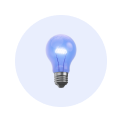
Solution we created revolutionized property management for real estate agents and contractors.
Some companies have already fully implemented IoT-enabled solutions in their stores. Following are several notable examples of IoT in retail.
One of the innovations that has transformed the way some retailers deliver their services is Amazon’s Just Walk Out technology. The concept is quite simple: a customer enters the store, activates an in-store code, takes everything they need, and walks out. The information about the purchase is collected through cameras, sensors and other devices, and the customer is charged for the purchase automatically. Just Walk Out technology is already used by major retailers such as Starbucks. It allows businesses to optimize human resources management and provide customers with a fast and convenient shopping experience that doesn’t involve waiting in line.
Another impressive innovation is the smart mirror, which integrates IoT technologies, AR, and AI. This technology is revolutionizing the way stores sell beauty products and clothes. Smart mirrors allow customers to try on clothes or makeup virtually, leave feedback, receive personalized recommendations, and check product availability. They save time and make the shopping experience more pleasant. Smart mirror functionality varies from retailer to retailer. H&M and Valentino Beauty are some of the popular stores that use smart mirrors.
IoT solutions are becoming increasingly popular in retail businesses. Innovations help companies optimize processes, reduce resource investment, enhance the customer experience and, as a result, increase revenue. The future of IoT in retail is promising; retailers will find new ways to leverage this technology and bring value to buyers.
You can become the next innovator by introducing IoT to your workflow with the help of the experts at EffectiveSoft. Contact us to learn more and partner up.
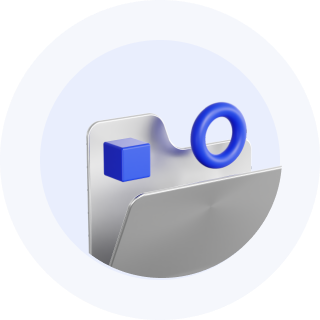
IoT in retail refers to the use of internet-connected devices or sensors to collect, transmit, and analyze data to improve the retail experience for both businesses and customers.
Retailers face several key challenges when integrating IoT solutions, including data privacy, compatibility with current systems, scalability, implementation cost, and staff training. Successful IoT adoption requires a well-rounded strategy that aligns technology with business goals and incorporates effective change management. The first step is consulting an experienced IT vendor. Reach out to our team to explore connectivity options and launch your IoT project.
IoT enables retailers to optimize and automate crucial processes like inventory, supply chain, and staff management. This leads to greater operational efficiency, improved customer loyalty and satisfaction, and increased revenue. IoT systems help minimize product waste, promoting more sustainable practices. They also enable advanced customer data analytics for informed decision-making, as well as enhanced security and theft prevention.
IoT integration may pose cybersecurity challenges like data breaches, device hijacking, and privacy concerns. However, this should not prevent your business from capitalizing on the advantages of this technology. Turn to a skilled, reliable IT vendor that follows best practices for data security and privacy, including encryption, device authentication, and regular updates. It’s also crucial to comply with data protection regulations and standards, such as GDPR and CCPA.
Can’t find the answer you are looking for?
Contact us and we will get in touch with you shortly.
Our team would love to hear from you.
Fill out the form, and we’ve got you covered.
What happens next?
San Diego, California
4445 Eastgate Mall, Suite 200
92121, 1-800-288-9659
San Francisco, California
50 California St #1500
94111, 1-800-288-9659
Pittsburgh, Pennsylvania
One Oxford Centre, 500 Grant St Suite 2900
15219, 1-800-288-9659
Durham, North Carolina
RTP Meridian, 2530 Meridian Pkwy Suite 300
27713, 1-800-288-9659
San Jose, Costa Rica
C. 118B, Trejos Montealegre
10203, 1-800-288-9659